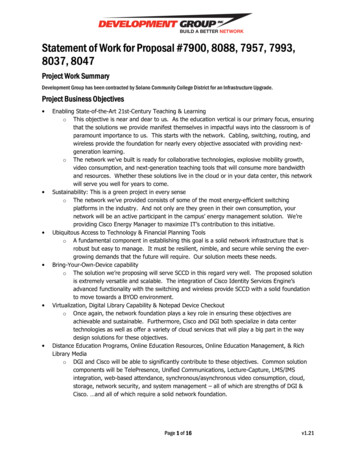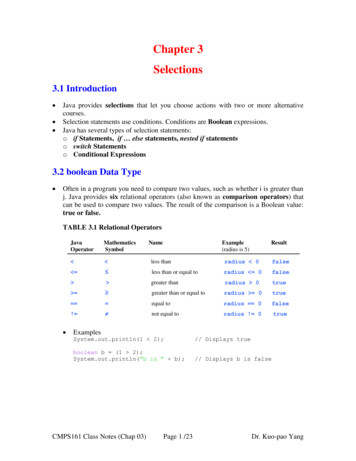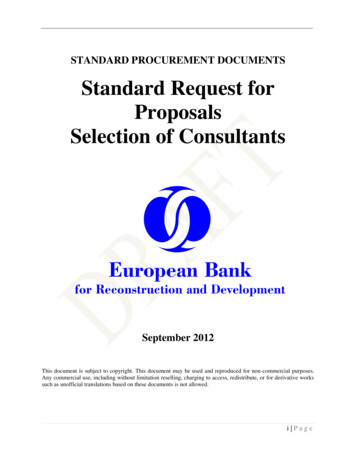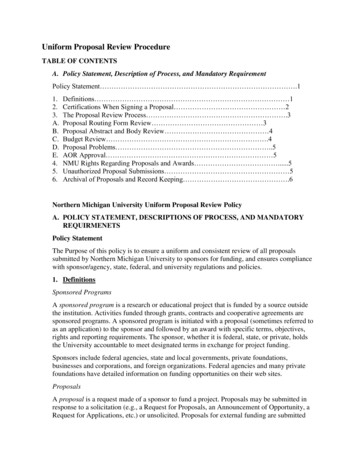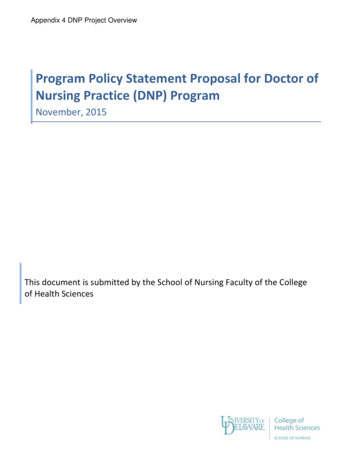
Transcription
Appendix 4 DNP Project OverviewProgram Policy Statement Proposal for Doctor ofNursing Practice (DNP) ProgramNovember, 2015This document is submitted by the School of Nursing Faculty of the Collegeof Health Sciences1
Appendix 4 DNP Project OverviewPART I. PROGRAM HISTORYA. Statement of Purpose and Expectation of Graduate StudyPurposeThe Doctor of Nursing Practice (DNP) program proposed by the School of Nursing in the College of HealthSciences prepares graduates to perform at the highest level of advanced nursing practice. With a focus onpopulation health and leadership, students will gain competencies that will allow them to become leaders inpractice innovation and policy development that will improve the health of diverse populations. The foundationfor practice expertise with a population health focus will enable the graduate to plan and lead evidenced-basedinterventions, quality improvement strategies and health policy changes that address patient safety, promotepatient-centered care, and reduce health disparities among diverse groups. The focus on practice thatintegrates both primary health care and mental health competencies will enable graduates of this program toprovide health care in diverse settings to communities and populations that are currently unable to easilyaccess care. The proposed program is timely because it coincides with recent legislation in Delaware thatsupports independent practice of nurses prepared as advance practice registered nurses (APRN) such asthose who will be prepared in the School of Nursing’s Doctor of Nursing Practice program.The DNP degree is designed for nurses seeking a terminal degree in nursing practice and offers an alternativeto the research-focused doctoral program. This degree prepares students to translate research into thepractice setting. It does not prepare the student to conduct original research. Students will develop a practicequestion and critically appraise available research to develop and implement a practice initiative thatrepresents best practices for improvement of the delivery of healthcare services. Coursework is designed toprovide the student the skills to understand the complexities of the health care delivery system in order toinfluence change and develop policy that improves patient outcomes in a variety of settings.The final product of the degree will not be a thesis or dissertation. There are no comprehensive exams.The program culminates in the successful completion of a DNP Project and its mandatory final products, whichinclude the DNP Project Brief, DNP Project Presentation, and the DNP Project Manuscript. In addition, theDNP Portfolio will be submitted as a final product to showcase achievement of program outcomes andcompetencies. The DNP project is conceptualized in the early stages of the program and is further developedeach semester, with coursework supporting the student’s growth throughout. Planning and implementation ofthe DNP Project provides a mechanism to apply concepts learned and to achieve program outcomes andcompetencies.This proposal includes a description of the post-baccalaureate and post- master’s DNP programs.The current master’s program for nurse practitioners will be phased out and all students willcomplete requirements for nurse practitioner certification within the DNP program. Students whohave already completed a master’s degree will enter the post-master’s DNP program.Background: Evolution of the Doctor of Nursing Practice DegreeThe American Association of Colleges of Nursing (AACN) affiliated member schools voted in October 2004, toendorse the Position Statement on the Practice Doctorate in Nursing (DNP). In this statement the AACNrecommended that education of advanced practice nurses be transitioned from master’s to doctoral levelpreparation by the year 2015. Since then, the number of DNP programs across the country has substantiallyincreased. As of June, 2015, 264 programs are currently operating in the United States with another 60programs reporting to be in the planning stages of development (AACN, 2015). DNP programs are nowavailable in 48 states.In 2008, the National Organization of Nurse Practitioner Faculties (NONPF) officially endorsed the DNP as theentry level for nurse practitioner practice. In April, 2015, the NONPF Board of Directors reaffirmed this positionand called for all NP educators to facilitate the transition from master’s to doctoral preparation. In September2015, a white paper, the Doctor of Nursing Practice NP Preparation: NONPF Perspective, was released. In this2
Appendix 4 DNP Project Overviewpaper, NONPF makes the definitive statement that “now- 2015 – is the time” for the profession to make thecommitment to move forward with the plan for DNP preparation for all nurse practitioners (NONPF, 2015). Inthis statement, the recommendation was for schools to offer a “seamless, integrated curriculum with a postbaccalaureate DNP pathway for preparation as entry to the NP role”. They also recommended that postmaster’s programs be available as a pathway for students who had already completed a master’s degree, inorder to enhance their skills in doctoral level competencies. Our proposed DNP brings the advance practiceprograms in nursing in line with the now well-accepted national standard.Market Assessment Doctor of Nursing PracticeCompatibility with the Mission of the University of Delaware: The proposed doctor of nursing practiceprogram (DNP) builds on the five core values of the University of Delaware “Delaware First, diversity,partnership, engagement, and impact. The proposed DNP program is designed to prepare advanced practicenurses who are equipped as population health and evidence based practice specialists who can provideleadership in addressing the major health problems of Delawareans. Eligible for licensure as nursepractitioners, graduates of the DNP will be specifically educated to address the basis for health disparitiesamong the most vulnerable populations in Delaware. These advance practice nurses will be able to engagecommunities and partner with leaders in those communities to address social and community level barriers thatimpede health. As the only DNP program in Delaware that will offer admission to baccalaureate preparednurses, and the only program that prepares graduates to provide both health and mental health care, theproposed DNP program will have significant impact on improving the health of Delawareans. The proposalcomes on the heels of recent state legislation that authorizes the independent practice of advanced practicenurses, the product of the proposed program.The proposal planning process has encompassed several years of faculty discussions culminating in a retreatof graduate faculty in early 2015, preliminary data gathering by the Graduate Education Committee during theSpring semester of 2015, the appointment of a task force in late spring 2015 and a proposal to the faculty inOctober, 2015. The DNP task force included Dr. Barbara Habermann, Associate Dean for TranslationalResearch, Dr. Andrea Wolf, nurse practitioner coordinator, Dr. Cynthia Diefenbeck, Dr. Susan Conaty-Buck, anurse practitioner and Dr. Susan Hall, Deputy Dean, College of Health Sciences. A nationally recognized DNPscholar, Dr. Kimberly Udlis provided on-going consultation during the development of the program.Impact on other university programs will be minimal. Students must have a baccalaureate degree in nursing ora master’s degree in nursing to be accepted into the DNP. No other majors will be eligible to apply to thisprogram.Use of Existing Resources: The proposed DNP program primarily will use existing resources at theuniversity. Individuals with expertise and experience in doctoral level instruction are currently faculty membersin the School of Nursing. Several of these have experience teaching in DNP programs specifically. Faculty inthe School of Nursing and the College of Health Sciences already teach similar core courses in the master’s ofscience program (e.g. Health Assessment, Advanced Pathophysiology, etc.) and clinical courses in the nursepractitioner program. Some of the proposed coursework will be shared with the PhD program in the School ofNursing and with faculty from the Hotel Restaurant and Institutional Management School. Additional faculty isrequested with the DNP proposal because some existing members of the nurse practitioner faculty are notprepared at the doctoral level and thus ineligible to teach in the program, and because the proposed DNPprojects are faculty intense.Target Population: Students with a baccalaureate degree or master’s degree in nursing who wish to pursue apractice doctorate with specialty preparation as a nurse practitioner are the intended targets of the program.Both full and part-time students will be encouraged to apply. A hybrid/blended, executive program approachwill attract nurses who often need to continue to work while they pursue an advanced degree. There areopportunities to transfer credits for both core and clinical courses.In 2013, a School of Nursing survey was sent to all enrolled MSN students, all RN to BSN and RN to MSNstudents, selected alumni of nearby states from the previous 10 years (from a list of 1200), and area hospitalsincluding Christiana, Bay Health, St. Francis, Union, Nemours, and Beebe. The total number of surveys sent isunavailable, however, over 200 responses were obtained. Most of the respondents (n 146) resided inDelaware. Eighty-eight of the respondents were masters-prepared; 96 held bachelor’s degrees.3
Appendix 4 DNP Project OverviewData from this survey overwhelmingly supported an active interest among respondents in pursuing a DNP.More than half of respondents indicated that their career goals include obtaining the DNP and 42% indicatedthat the University of Delaware was their preferred educational institution of choice. More than half indicatedthat a hybrid on-line program was their preference, similar to the proposed DNP program. Overwhelmingly, thisset of respondents preferred a part-time program, something that is built into the proposed plans of study forthe DNP. Also built into the program is respondents’ desire for a year round program. Thus regional surveydata indicate a robust supply of students for a DNP that has been designed with their educational preferencesin mind.Demand and Employment Factors: In 2004 the American Association of College’s of Nursing (AACN) setthe minimal standard for entry level advanced practice as the DNP. In 2006 the AACN issued a position paperurging Schools of Nursing to adopt this standard by 2015. That the DNP serve as the entry level of nursepractitioner practice was also adopted by the National Organization of Nurse Practitioner Faculty in 2008. Thisposition was reaffirmed in a statement issued to its membership in August 2015, indicating that all NPeducators should strive to overcome barriers to this transition. Thus the proposed DNP is responsive to thenational standards set by major national nursing organizations.Doctorates in nursing practice have proliferated across the country and are responsible for a growingproportion of advanced practice nurses across the country. About 30% of Schools of Nursing currently offer aBSN to DNP program but that is expected to expand to 50% by 2016 (Auerbauch, et al.). The number ofSchools offering the DNP has expanded from 20 in 2006 to 251 in 2013 (Auerbach et al.) indicating that theproposed DNP is part of the growing adoption of the national standard for entry level advanced practice. Theproposed BSN to DNP is the only program of its kind in the state; the University of Wilmington offers a postmaster’s DNP and is the only other DNP program offered in Delaware. Other DNP programs offered regionallyinclude Thomas Jefferson University, University of Pennsylvania, Widener University, University of Maryland,Johns Hopkin’s University, and Salisbury University. These programs vary from fully online to hybrid/blendedand from post-BSN to post-master’s.Graduates of DNP programs fulfill a number of clinical and management roles in practice settings as well asserve as faculty in Schools of Nursing. Data from the Educational Advisory Board (Hickson & Dowdy, 2015)showed that there were just under 5000 job postings in the mid-Atlantic region (Delaware, Pennsylvania,Maryland, Virginia, West Virginia, North Carolina) in 2014 for DNP qualified candidates. In Wilmington,Delaware alone, 128 jobs for DNPs were posted in 2014. The skill sets sought include those to be taught in theproposed DNP program including collaborative practice, patient care, primary care, program evaluation, andcurriculum development. Data from the Robert Graham Center, a research arm of the American Academy ofFamily Practitioners (Petterson, et al., 2013) and a white paper from the Delaware Health Commission indicatethat there are current and anticipated shortages in primary care and mental health care in Delaware, roles thatgraduates of the proposed DNP will be able to fill. Other data show a profound nursing faculty shortage thatshows a vacancy rate for faculty at almost 7% (Rossiter, 2015). The proposed DNP program will be a source ofnew nursing faculty for all of the nursing education programs in Delaware. Thus graduates from the proposedDNP program will have a ready job market filling vital roles in Delaware’s health care sector.B. Date of Permanent StatusThe date of permanent status is expected to be Academic Year 2023/2024.C. Degree OfferedStudents who successfully complete this program will be awarded the degree of Doctor of NursingPractice (DNP) from the School of Nursing in the College of Health Sciences.PART II. ADMISSIONA. Admission Requirements, Prior Degree Requirements and Special CompetenciesStudents will be admitted as either post-baccalaureate or post-master’s students depending on their prioreducational achievement. Admission requirements differ for post-baccalaureate and post-master’s4
Appendix 4 DNP Project Overviewapplicants. Admission decisions will be made by the School of Nursing Graduate Education Committee andDNP Subcommittee. Students will be admitted to the program based on their ability to meet the followingminimum recommended entrance requirements and enrollment availability.Post-baccalaureate Applicants: Baccalaureate degree in nursing from an NLNAC or CCNE accredited School of NursingUndergraduate GPA of 3.0 or higherCopy of active Registered Nurse (RN) license(s) in the state of Delaware or a compact state(state which has license reciprocity with the Delaware State Board of Nursing) or demonstratedeligibility for licensurePost-master’s Applicants: Master’s degree in nursing from an NLNAC or CCNE accredited School of Nursing with nationalcertification in an area of advanced nursing practiceGraduate GPA of 3.5 or higherLetter from the master’s program indicating the number of clinical hours completedAll Applicants (as applicable): Relevant professional experienceCopy of license in a state where clinical practice may be arrangedCompletion of a master’s level statistics course in the past 5 years with a grade of B- or betterOfficial results from the TOEFL or IELTS exam taken within the last 2 years (for nonnative English speaking applicants only). The minimum TOEFL score is 100; theminimum IELTS is 6.5.B. Application DeadlinesApplications will only be accepted once a year during the Spring semester. The deadline is February 1, forconsideration of enrollment for the Fall semester of the same year.C. Admission CategoriesStudents will usually be admitted under regular status. However, provisional status may be granted for postbaccalaureate students whose RN licensure is pending for up to one semester. Provisional status may also begranted for post-master’s applicants whose national certification is pending, for up to one semester.D. Other Documents Required A written statement that clearly identifies the applicant’s career goals and how admissionto the program will facilitate his or her professional objectives. Three letters of recommendation: two from an academic, and one from employer and/orother professional source. Academic references must be from someone who is doctorallyprepared and who can attest to the student’s capacity to complete a doctoral program. A successful interview with the DNP Program Coordinator and members of the DNPSubcommittee. Demonstrated competence in written communication through submission of a writing sample A curriculum vitae or resumeE. University StatementAdmission to the graduate program is competitive. Those who meet stated requirements are not guaranteedadmission, nor are those who fail to meet all of the requirements necessarily precluded from admission if theyoffer other appropriate strengths.PART III. ACADEMIC5
Appendix 4 DNP Project OverviewThe program was developed using the Essentials for Doctoral Education for Advanced Nursing Practice(AACN, 2006), the NONPF NP Core Competencies Curriculum Content (NONPF, 2014), and the ClinicalPrevention and Population Health Curriculum Framework (Association for Prevention Teaching and Research[APTR] 2015), The Essentials document is considered to be the national standard for education of alladvanced practice registered nurses (APRNs) at the doctoral level. It consists of eight categories of curricularelements and competencies that should be included in all practice doctorate programs for the four APRN roles:nurse practitioners, clinical nurse specialists, nurse anesthetists and nurse midwives. It also outlines criteriafor the number of clinical hours (1,000) and the types of clinical practice experiences that should be included inall DNP programs. Finally, it describes the characteristics of the final DNP project as the culmination of thestudent’s scholarly work applied in the clinical setting, which represents mastery of an advanced practicespecialty.The NONPF NP Core Competencies were developed as guidelines for educational programs preparing nursepractitioners (NP) to practice as licensed independent practitioners. Initially, core competencies for NPs weredeveloped at the master’s level. However in 2008, NONPF initially endorsed the DNP as entry level for NPeducation. Following that endorsement, the NONPF Core Competencies were revised in 2011 and again in2012 to reflect DNP level competencies. The Core Competencies consist of nine categories that should bemastered by all nurse practitioners, regardless of their population focus.The Clinical Prevention and Population Health Curriculum Framework was developed by the APTR to providea common core of knowledge related to Individual health, population health and health promotion. TheFramework was designed to be used by health professions educators in curriculum planning. It consists of fourcomponents with 23 domains that address the delivery of clinical services using a population health approach.A consultant was contracted to guide curriculum development in the early stages of planning. Our consultant,Dr. Kimberly Udlis is a nurse practitioner educator with experience in the development of DNP programs. Shehas conducted research and published in the area of DNP education and is a member of the AACN DNP Taskforce.A. Degree RequirementsThe DNP Program is available at two entry levels – post-baccalaureate and post-masters. There is a corecurriculum that all students must complete, and courses specific to population-focused advanced practicenursing concentrations that lead to eligibility to sit for national certification. The course requirements for thisprogram include 14 DNP core courses, 5 NP core courses and 7-8 courses specific to the population foci.These include family nurse practitioner (FNP), adult-gerontology nurse practitioner (AGNP) andpsychiatric/mental health nurse practitioner (PMHNP).All students must complete the DNP and NP core courses. Clinical hours are included in course requirementsfor both core courses and for population-focused concentration courses. Students are admitted as cohorts into3-year full-time and 5-year part-time plans of study and are expected to maintain progression with their cohortas outlined upon admission. However, students must complete all course work within a 7-year time frame inorder to be eligible to earn the degree.Post-Baccalaureate DNP ProgramThe Post-baccalaureate DNP program requires the completion of 78 course credits. Students entering thePost-baccalaureate DNP Program will choose a population-focused clinical concentration and complete allcourses to meet eligibility requirements to become certified and licensed as an advanced practiceregistered nurse (APRN). There are full time and part time options for the post-baccalaureate program.Upon program completion, students will be eligible to apply for a national certification exam in one of thepopulation foci. Credits for the specific population-foci are as follows:Family Nurse Practitioner (FNP): 78 credit hours and 1120 clinical hours (direct care: 784 /indirect: 336)Adult-Gerontology Nurse Practitioner (AGNP): 78 credit hours and 1120 clinical hours (direct care: 784/indirect: 336)Psychiatric-Mental Health Nurse Practitioner (PMHNP): 78 credit hours and 1008 clinical hours (direct care:6
Appendix 4 DNP Project Overview672 /indirect: 336)Tables below indicate all courses, credits and clinical hours required for the specific concentrations. The fulltime and part-time plans of study for the post-baccalaureate program are found in Appendix 1 and 2respectively.DNP Core Courses*CoursesNURS881 Population Health INURS882 Population Health IINURS813 Leadership and InnovationNURS844 Population Healthcare InformaticsNURS843 Policy and Finance for Healthcare DeliveryNURS883 Evidence-based Practice I: MethodsNURS886 Evidence-based Practice II: TranslationNURS852 Integrated Healthcare Delivery INURS873 DNP Project I: Problem IdentificationNURS874 DNP Project II: Planning & DevelopmentNURS900 DNP Project III: ImplementationNURS910 DNP Project IV: Evaluation & DisseminationNURS920 Clinical Role Immersion – Post-master’s***ORNURS921 Clinical Role Immersion- Post-baccalaureateCredits333333333(1 2)**3(1 2)**3(1 2)**1Clinical Hours1121121121-3 (Variable or coursewaiver***5 (2 3)56-168 or coursewaiver***168NURS870 Writing for Dissemination2TOTAL36-41336-504* Post-master’s students are required to take only DNP Core Courses**1 2 indicates 1 credit of didactic hours and 2 credits of clinical hours***This course may be waived for post-master’s students who have completed 664 or more clinical hours intheir master’s program.Nurse Practitioner Core Courses*CoursesNURS621 Advanced PathophysiologyNURS622 Advanced PharmacologyNURS677 Advanced Health Assessment & Diagnostic ReasoningNURS853 Integrated Healthcare Delivery IINURS818 Advanced Nursing ScienceTOTAL*NP Core Courses are taken by students in all concentrations.CreditsClinicalHours3333113Course requirements for the available concentrations are listed on the following tables:Population-Focus: Family Nurse Practitioner*CoursesNURS691 Primary Care INURS692 Primary Care NP Practicum INURS693 Primary Care IINURS694 Primary Care NP Practicum IINURS679 Primary Care of ChildrenNURS678 Primary Care of WomenCredits444432ClinicalHours2242247
Appendix 4 DNP Project OverviewNURS696 Primary Care NP Practicum IIIFNP TotalNP Core Courses TotalDNP Core Courses TotalTOTAL*Post-baccalaureate students also take DNP Core Courses**NURS921 is substituted for NURS9203241341781686165041120Population-Focus: Adult- Gerontology Nurse Practitioner*CoursesNURS691 Primary Care INURS692 Primary Care NP Practicum INURS693 Primary Care IINURS694 Primary Care NP Practicum IINURS695 Primary Care of Frail/Older AdultsNURS678 Primary Care of WomenNURS696 Primary Care NP Practicum IIIAGNP TotalNP Core Courses TotalDNP Core Courses TotalGRAND TOTAL*Post-baccalaureate students also take DNP Core Courses**NURS921 is substituted for 86165041120Population-Focus: Psychiatric/Mental Health Nurse Practitioner*CoursesNURS668 Advanced Clinical NeuroscienceNURS669 Advanced PsychopharmacologyNURS671 Psychiatric/Mental Health NP INURS672 Psychiatric/Mental Health NP Practicum INURS673 Psychiatric/Mental Health NP IINURS674 Psychiatric/Mental Health NP Practicum IINURS675 Psychiatric/Mental Health NP IIINURS676 Psychiatric/Mental Health NP Practicum IIIPsych NP TotalNP Core Courses TotalDNP Core Courses TotalGRAND TOTAL*Post-baccalaureate students also take DNP Core Courses***NURS921 is substituted for 685045041008Post-master’s DNP ProgramThe post-master’s DNP program includes completion of all DNP core courses, a total of 36 course credits.Additional credits (1-3) will be required in a clinical immersion final course, depending on the number of clinicalhours completed in the previous master’s program. The purpose of these credits is to ensure that studentscomplete a total 1,000 clinical hours as recommended by the AACN. Students who apply to the post-master’sDNP option must hold national certification in an area of advanced nursing practice. Their pathway through theprogram will vary by the credentials they present upon admission and will also depend on their career goals.There is a part time option for the post-masters program. The plan of study for the post-master’s DNP can becompleted in either 2 or 3 years. Appendix 3 contains the post-master’s plans of study. Pathways include:8
Appendix 4 DNP Project Overview1. Post-master’s with license and certification as an advanced practice registered nurse (APRN) [clinical nursespecialist, nurse anesthetist, or nurse midwife] for the individual who seeks certification as a nurse practitioner.Requirements:Students will complete all DNP core courses (listed on page five) and all nurse practitioner coursesspecific for the population focus of their choice in order to be eligible to apply for national certification.Applicants who have completed more than 500 hours in their master’s program and desire credit for thesehours must submit a letter from their master’s program documenting the number of hours completed. Theadvanced pharmacology course taken in previous master’s coursework will only be approved provided ithas been taken within the previous 3 years before matriculation. If the course is older than 3 years, it mustbe completed prior to beginning population-specific clinical courses.The following table is an example of a plan of study for a post-master’s student seeking a new advancedpractice nurse role:Required courses for a post-master’s DNP student licensed as a CNS with a Master’s degree, seekingcertification as a Adult-Gerontology NP (Sample)ClinicalCoursesCreditsHoursNURS881 Population Health I3NURS882 Population Health II3NURS813 Leadership & Innovation3NURS844 Population Healthcare Informatics3NURS843 Policy and Finance for Healthcare Delivery3NURS852 Integrated Healthcare Delivery I3NURS883 Evidence-based Practice I: Methods3NURS886 Evidence-based Practice II Translation3NURS873 DNP Project I: Problem Identification3 (1 2)*112NURS784 DNP Project II: Planning and Development3 (1 2)*112NURS900 DNP Project III: Implementation3 (1 2)*112NURS910 DNP Project IV: Evaluation & Dissemination1NURS870 Writing for Dissemination2NURS691 Primary Care I4NURS692 Primary Care Practicum NP I4224NURS693 Primary Care II4NURS694 Primary Care Practicum II4224NURS695 Primary Care of Frail/Older Adults3NURS678 Primary Care of Women2NURS696 Primary Care Practicum III**3**112NURS853 Integrated Healthcare Delivery II3TOTAL63896*1 2 indicates 1 credit of didactic hours and 2 credits of clinical hours**This course will be offered for 1 credit with 56 hours of clinical. Three credits of this course will be requiredwith a total of 112 hours.2, Post-master’s with RN license and national certification in a non-APRN area of nursing practice (e.g. nurseeducator, nurse administrator).Requirements:Students will complete all DNP core courses. Applicants will be given credit for 500 clinical hours uponentering the program.3. Post-master’s with previous nurse practitioner certification and licensure seeking certification in anadditional nurse practitioner population focus9
Appendix 4 DNP Project OverviewRequirements:Students will complete all DNP core courses. Because these students will enter with different clinicalbackgrounds, the clinical component of the program will include an individualized plan of study. Studenttranscripts and previous syllabi may be evaluated for equivalence to selected required course work fornational certification.Post-DNP CertificateDNP-prepared nurses with national certification in an area of nursing practice may seek preparation as anurse practitioner in one of the concentrations offered. In this case, students will complete only thosecourses required for the population-focused NP program of their choice that will allow them to apply fornational certification. A certificate will be awarded.Program Format and Course DeliveryThe DNP program will utilize a cohort model. Students will follow a prescribed plan of study and progressthrough the program in a cohort group.The program will be offered as a blended/hybrid program. Some courses will be offered fully online;others will be primarily online with periodic in-person class sessions. In general, classes will meet oncampus for 2-3 days at the beginning and 2-3 days at the end of the semester. Some courses may meetmore frequently. During the semester, synchronous web conferencing will be scheduled twice monthly.Clinical HoursAccording to the AACN DNP Essentials, DNP students need a minimum of 1,000 hours of post-baccalaureatesupervised clinical practice hours to achieve the DNP competencies. Beyond the traditional MSN, clinicalexperiences at the DNP level expand the student’s practice to DNP level expectations. Post-baccalaureate
The Doctor of Nursing Practice (DNP) program proposed by the School of Nursing in the College of Health Sciences prepares graduates to perform at the highest level of advanced nursing practice. With a focus on population health and leadership, students will gain competencies that will allow them to become leaders in .







